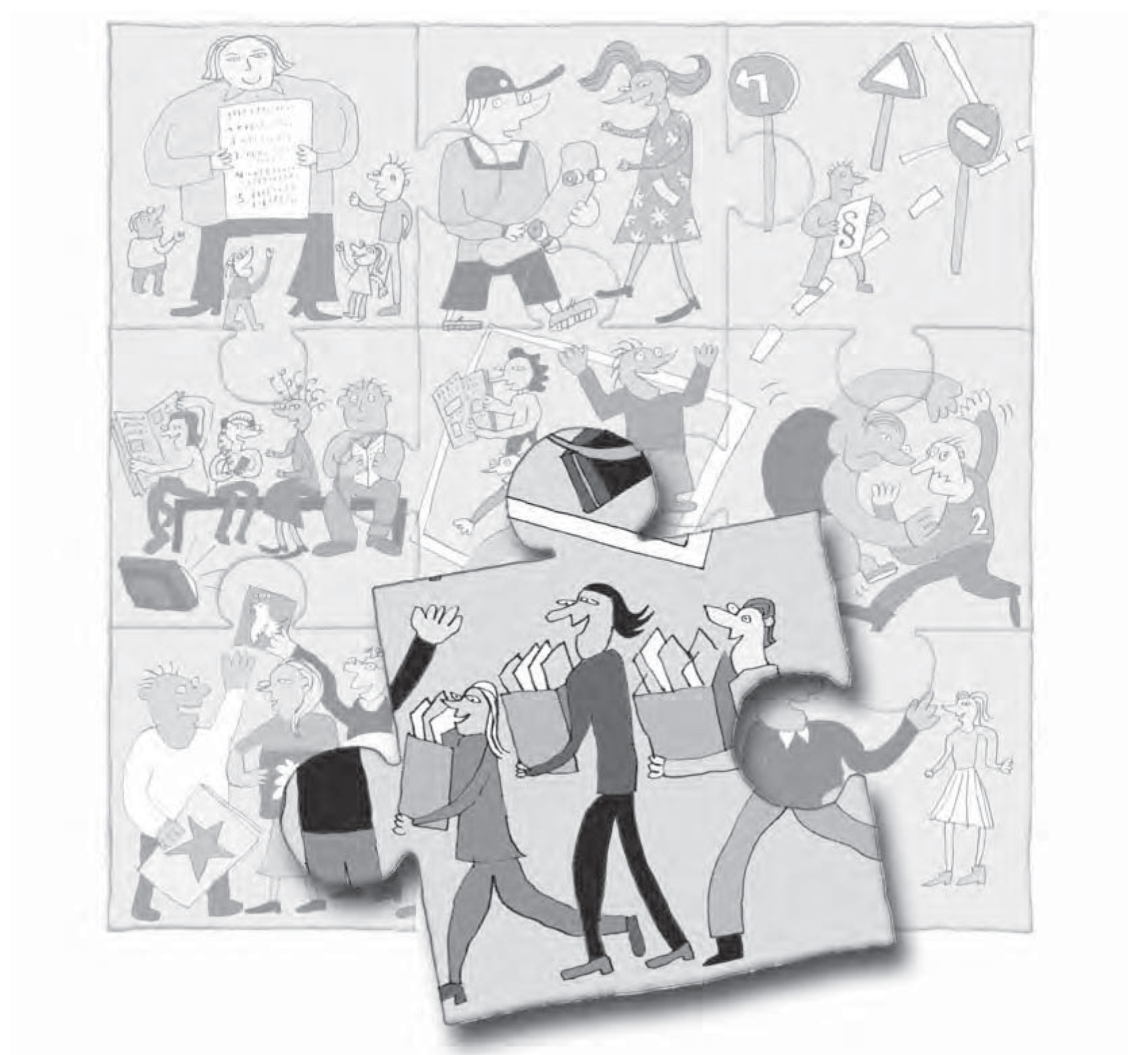UNIT 6: Responsibility
Living Democracy » Textbooks » Living in democracy » Part 2: Taking responsibility » UNIT 6: ResponsibilityWhat kind of responsibilities do people have?

Legal responsibility
Citizens of any state are entitled to know what their rights are in law and also to appreciate the extent of their legal responsibilities to the state and to other citizens. The responsibilities of citizens of democracies are sometimes summed up in three main duties, namely to vote, pay taxes and obey the law.
Responsibilities are often the obverse of rights. For example, the right to free speech brings with it the responsibility to allow the same right to others. However, people who commit crimes do not necessarily lose the rights they denied to others (as in the case of killing or discrimination). Equally, people often have obligations which are not reciprocal, for example, responsibilities towards children.
Moral responsibility
In EDC it is very important to nurture young people’s capacity to think morally. Without this capacity, there can be no critical evaluation of society’s laws or social structures in terms of whether they are fair (just). For this reason, when students are taught about laws which affect them, they should also be encouraged to critically evaluate their function and purpose and whether they should be changed in any way.
Teaching for responsibility
By examining the reasons why people behave in a pro-social way, or highlighting the extent of other people’s needs, teachers can help students become more aware of the needs and rights of others. It is also important for teachers to demonstrate attitudes of responsibility in front of students.
Students learn to become responsible citizens not only through study in the classroom, but also through being given the opportunity to learn from experience. In this respect, the good EDC school will be keen to encourage students to be involved in the life of the school and the wider community, for example, through school councils.
In this unit students will:
|
UNIT 6: Responsibility
What kind of responsibilities do people have?
| Lesson title | Learning objectives | Student tasks | Resources | Method |
|
Lesson 1: Responsibilities at home |
To explore the ränge of responsibilities people have. To understand that responsibilities can come into conflict with each other. |
Students analyse the moral dilemma. Students discuss alternative analyses. Students make individual statements. |
Copies of the story “Milan makes a choice”. Paper for written tasks. |
Individual and small group discussion. Plenary discussion. Individual written work. |
|
Lesson 2: Why should people obey the law? |
To explore the moral reasoning underlying decisions about conflicts of responsibility.
|
Students analyse a moral dilemma. Students critically evaluate reasons for legal obedience. Students suggest situations in which a moral duty might override the duty to obey the law. |
Copies of the story “Schmitt’s Dilemma”. Paper for written tasks. Blackboard. |
Shared analysis of moral dilemma. Teacher-supported analysis. Story writing. Plenary discussion. |
|
Lesson 3: Whose problem is it? |
To explore the nature of people’s legal responsibilities. To explore the distinction between moral and legal obligations. |
Students discuss responsibility for certain social problems. Students complete a thinking frame. Students produce written responses to the issues raised. |
Copies of the “letter”. Blackboard. Paper for individual student writing. |
Structured critical analysis. Small group analysis and discussion. Consensus reaching and negotiation. Personal writing. |
|
Lesson 4: Why do people become active citizens? |
To consider the shared nature of responsibility for social problems. To consider reasons why people accept responsibility for other people’s suffering. To explore the role of NGOs in civil society. |
Students work in groups to piece together a narrative. Students hypothesise on the reasons for socially motivated behaviour. Students consider the role of NGOs. In groups, students research the work of an NGO or a social campaigner. In groups, students present their findings. |
Copies of the slips about Jelena Santic (student handout 6.4), already cut up. Resources to support student research. Resources for group presentations, e.g. large sheets of paper, coloured pens. |
Group work. Negotiation. Moral reasoning. Critical evaluation. Research. Group presentation. |
- Lesson 1: Responsibilities at home
People experience conflicts of loyalty – how should they decide? Learning objectives To explore the range of responsibilities people have. To understand...
- Lesson 2: Why should people obey the law?
What are the best reasons for obeying the law? Learning objectives To explore the nature of people’s legal responsibilities. To explore the...
- Lesson 3: Whose problem is it?
How are social responsibilities shared? Learning objectives To consider the shared nature of responsibility for social problems. Student tasks Students discuss responsibility...
- Lesson 4: Why do people become active citizens?
Why do people want to change society and how can they do it? Learning objectives To consider reasons why people accept responsibility...
- Student handout 6.1: Milan makes a choice
Milan was nearly ready to leave for school when his father came into the kitchen. “Milan, I really need your help today...
- Student handout 6.2: Schmitt’s dilemma
Schmitt’s only daughter is very ill. She needs an operation urgently but the only doctors in the area who can do it...
- Student handout 6.3: Things are getting out of control!
Consider the following letter, which appeared in a local paper. As a group of local residents, we are very concerned about a...
- Student handout 6.4: Card sort: the life of Jelena Santic
1. Jelena Santic was born in 1944. She was Serbian. 2. Jelena Santic died of cancer in 2000. 3. After Jelena died,...

